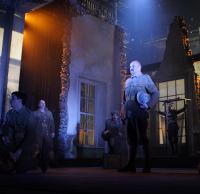Review - 'The Silver Tassie' at the National Theatre 2014
Sean O' Casey's first three plays - The Shadow of the Gunman, Juno and the Paycock and The Plough and the Stars - were all premiered at Dublin's Abbey Theatre in the 1920s, with the last one causing riots that led the playwright to re-locate to London. According to a programme note, two of the Abbey's directors - WB Yeats and Lennox Robinson - visited the playwright in London imploring him to send his next play to the Abbey, which he duly did. But then the unthinkable happened: Yeats rejected the play.
In a letter to the playwright, he explained his dislike of it: "You are not interested in the Great War; you have never stood on its battlefields or walked its hospitals, and so write out of your opinions. You illustrate those opinions by a series of almost unrelated scenes as you might in a leading article."
The play was to instead receive its premiere at the West End's Apollo Theatre in 1929 - the same theatre, by coincidence, where RJ Sherriff's rather more accessible wartime play Journey's End had also premiered less than a year earlier.
Seeing the National's rare revival of it now, it's a play not without difficulties - it's not an easy play to watch, with its bleak but bracing shifts of tone and its second expressionistic scene that makes you both jump out of your seat (thanks to the noisiest explosions and display of pyrotechnics I think I may have ever heard in a theatre), but then slumber down with its mass-like musical incantations from the frontline of a war-ravaged terrain.
But there's something bold and brave, about it, too, that is theatrically impressive and poetically haunting. O'Casey may not, according to Yeats, have stood on the battlefields of war; but he has imagined them as only a playwright can, and he has certainly spent time in its hospitals, convalescing as a civilian on one of its wards.
O'Casey's own judgement on his play was trenchant: "A generous handful of stones, aimed indiscriminately, with the aim of breaking a few windows. I don't think it makes a good play, but it's a remarkable one." And so it proves in director Howard Davies's production, which also breaks walls, crockery and silverware, and ultimately your heart, too.
Its lead character Harry - who has won the Silver Tassie cup of the title for football in the play's opening scene but later loses the use of his legs in the war - is betrayed by those around him. The play has a beating heart and a poetic rage, simmeringly expressed in Davies's leisurely, lavishly staged production.
As ever with this director, it is layered with wounding feeling and deeply etched, textured performances.
"... the production conjures up the terror of war with some of the most shattering pyrotechnic effects I have ever seen and heard in a theatre. They seem to shake the whole auditorium."
Charles Spencer for The Telegraph
"The performances are perfectly in pitch with the directorial vision."
Michael Billington for The Guardian
"The play jolts from one setting to the next, and while this may highlight the disorientating effects of war, there's a fatal lack of story and psychological depth."
Henry Hitchings for The Evening Standard
External links to full reviews from popular press
- Telegraph - Guardian
Originally published on
